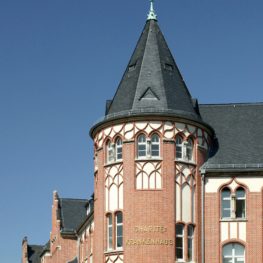Charité – Universitätsmedizin Berlin
| Location | Berlin is the capital and largest city of Germany. Nearly one-third of Berlin’s 3.5 million inhabitants are younger than 25, and the city hosts almost half a million internationals from 184 countries. Berlin is proud of its large and varied cultural scene, which includes three opera houses, more than 150 theatres and concert halls, 400 independent theatre groups, 70 museums, 200 art galleries, 120 cinemas and numerous other cultural centres. In Berlin, scientists in every field have always found optimal conditions for pursuing their work, Rudolf Virchow, Robert Koch and Albert Einstein among others. Berlin is also the largest university city in Germany with nearly 200,000 students enrolled in 15 universities and research facilities. Charité – Universitätsmedizin Berlin, dating back to 1710, is the unified medical faculties of Freie Universität Berlin and Humboldt Universität Berlin and one of the most renowned medical schools in Europe today. |
| Course focus | Study Focus
The Master of Science Programme in International Health raises awareness of current global health problems and allows students to identify and critically analyse key factors shaping the health and well-being of populations. The programme contributes to sustainable development and focuses on improving the management of health services for disadvantaged populations with a focus on low and middle income societies. The tropEd Network Content Structure Quality Assurance Duration / ECTS Credits |
| Target group | Selection of participants is guided by the programme’s emphasis on a multidisciplinary approach to international health. Students from a variety of backgrounds are recruited, including medical professionals, public health, social scientists, health educators and health managers. |
| Course language | English |
| Entry requirements | (i) Completion of a 3.5-year Bachelor (210 ECTS credit points) or equivalent degree in a health-related field. Holders of a 3-year Bachelor (180 ECTS credit points) or equivalent degree can apply but need to obtain extra 30 ECTS credit points through additional advanced modules (15 ECTS credit points) and an additional critical literature review (15 ECTS credit points). (ii) All applicants must have at least one year professional experience. If this professional experience was health related and obtained in a low- or middle-income country, it can be recognised as relevant professional experience. (iii) Proficiency in English is to be demonstrated by a TOEFL score of at least 550 PBT, 213 CBT, 80 iBT, IELTS Band score of at least 6.0 or an equivalent approved test. |
| Degree awarded | Master of Science in International Health (MScIH) |
| Course begins | Winter Semester: early September |
| Course duration | Full-time studies last between 12 months (students who have gained relevant professional experience prior to the start of the programme) and 24 months (students who still need to acquire relevant professional experience during the programme). Upon request the programme can be also studied part-time. |
| Application deadline | The deadline for applications is March 31 of the same year of the start of the programme. Applicants will be notified on admission/rejection in early May. Application forms can be downloaded from our webpage |
| Remarks | Tuition If the programme is entirely done at the Institute of Tropical Medicine and International Health at Charité – Universitätsmedizin Berlin tuition fees of ca. 12,050 Euros should be expected (core course 4,500 Euros, advanced modules ca. 5,500 Euros, relevant professional experience essay 250 Euros, thesis 1,800 Euros). In addition, students of Charité – Universitätsmedizin Berlin must pay a registration fee, presently approximately 320 Euros/120 Euros (with/without Berlin public transport ticket) per semester, i.e. twice annually. Special services All students are offered a one-week introductory orientation prior to the start of the programme (free of charge), as well as free academic and statistics support services, guidance and counselling through the staff of the programme and free/subsidised attendance to conferences in Berlin (e.g. World Health Summit, Humanitarian Assistance Conference) Scholarship |



